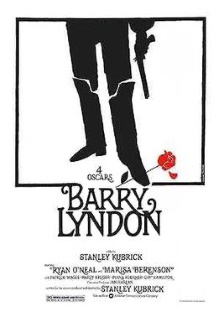
This marks the last of Stanley Kubrick’s films that I have yet to watch. I was reminded of its existence only due to Filmworker as Leon Vitali got his start with the grandmaster director here with a supporting role. As always I am astounded by Kubrick’s ability to make masterpieces of completely different genres and this is indeed a beautiful film on multiple levels. Still though it proceeds at a sedate pace, this should be considered one of his more conventional and approachable films.
With the help of a third-party narrator, this film recounts the life of the man who was born as Redmond Barry and would later be styled Barry Lyndon. Born in Ireland and raised by his mother, his first brush with trouble came when due to an infatuation with his cousin, he challenges a British officer to a duel for her hand. After seemingly killing the officer, he flees only to be robbed by a highwayman. With no other recourse he enlists in the British Army and is sent off to Germany to fight in the Seven Years’ War. This is only the beginning of his many adventures as he participates in battles, deserts, gets found out as an impostor by the allied Prussian Army and so on. Eventually in middle age he decides to settle down and seduces the wealthy Countess of Lyndon whose husband is frail and ailing. He succeeds in provoking the husband enough into a conniption that leads to his death and marries the widow shortly after. So he lives the leisurely life of the landed gentry for a time but as these stories always go, it is not meant to last.
The source material is a 19th century novel and given that it’s rather obscure, it seems strange that Kubrick would want to make such a film. It seems that he originally intended to make a film about Napoleon but had to change his plans. I’d imagine that the story is rather typical of the picaresque novels of that period and Kubrick doesn’t really add anything new to that. Indeed, while the first half is fun and entertaining as we don’t quite know what is going to happen next, the second half drags on, especially as the narrator already tells spoils the ending and we’re just waiting for Barry’s inevitable downfall. It is remarkable that Ryan O’Neal plays Barry with a kind of soft-spoken emotional detachment that is rather at odds with all the excitement that is going on around him. This reinforces the impression that Barry is someone who is not fully in control of his destiny as he is constantly pushed around by events and people. Perhaps that too is part of what life was like in the 19th century.
One thing that holds true across all of Kubrick’s film is that each of them breaks new ground in terms of technology or technique. While Barry Lyndon seems like a more conventional film, its affected painterly aesthetic is made possible only by the use of extraordinary technology such as high advanced lenses originally developed for NASA. As such, every shot in the film is a work of art and many would have been impossible to shoot without the specific innovations at work here. This is most obvious in the wide landscapes that were deliberately patterned after paintings of the period but also applies to the candlelit interior scenes. I may have found the plot to be mundane in the second half but the film’s sheer beauty remains unmarred throughout.
The result is a beautiful epic with a story that is conventional yet intelligently crafted. Something like this could never be one of my favorites but it does represent an incredible cinematic experience and Kubrick once again impresses me as one of the true geniuses of the medium.